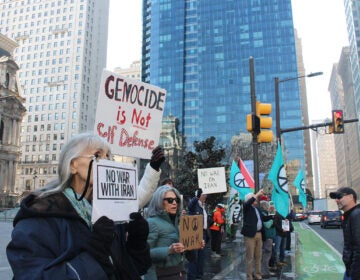One-party town? Not exactly
Here’s a quote from last week, spoken by a politician angry at a reporter:
“You’re a liberal paper aren’t you? You want all the liberals to read this like this office is corrupt. You say that and I can jump over this table and punch you out.”
OK, pop quiz. Guess the speaker’s political affiliation.
If you said Tea Party, or anything of that ilk, well, BZZZZZ, you’re wrong.
It’s Marge Tartaglione, Democratic city commissioner in Philadelphia.
Buzz about this incident has mostly been about the spectacle of a 77-year-old woman threatening to punch someone.
I’d like to call attention to this different aspect: A Democratic pol spitting out the word liberal as though it were a curse, just as Sean Hannity might.
There’s so much going on there. In the conventional wisdom, given the enfeebled of the city’s Republicans, Philadelphia is a one-party town.
It is, but then again, it isn’t.
Though the city will turn out bright blue for a presidential election, its Democrats really break into at least three camps. Let’s call them white tribal, black tribal and civic goo-goo, or as Marge would have it, liberals.
For the tribal parties, politics is all about protecting your own. For most of living memory, political life in Philadelphia has been a zero-sum game, a war of all against all for pieces of a shrinking pie.
The whole point of politics was to do whatever it took to make sure your tribe got its piece of the pie. Trying to get the tribal leaders to see their self-interest as corrupt – well, that’s about as easy as convincing a fish to hop out of the sea and live on land.
The civic goo-goos (or good-government types), meanwhile, find their identity not in tribe, but in ideas, one of which is reform, another the civic good. That’s one of the many things former mayor John Street, a tribalist of the first rank, hates about current mayor Mike Nutter. Nutter caters to and behaves like the civic goo-goos.
I’m borrowing here from the work of social theorist Robert Putnam, famous among wonks as the author of Bowling Alone. Putnam once looked at how different parts of Italy adjusted to regional government. He found that the areas used to thinking in terms of civic identity – the places that were great Renaissance city states like Florence – adapted best.
The places with a culture ruled by tribal identity and blood ties, places like my ancestral Sicily, struggled mightily to cope with modern challenges.
Philly politics remain way more Sicily than Florence.
WHYY is your source for fact-based, in-depth journalism and information. As a nonprofit organization, we rely on financial support from readers like you. Please give today.




